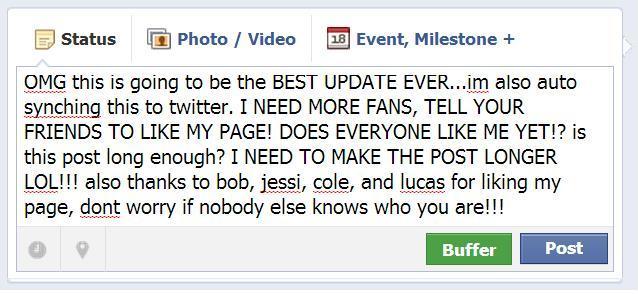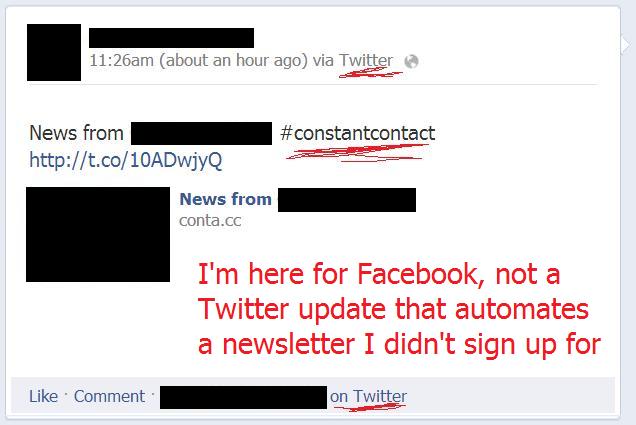
You don’t want to annoy your audience, do you?
If you answered yes, well, thanks for reading my blog, reps from Ocean Marketing. Otherwise, as a good social media community manager you’ve identified that you’re as only as successful as your fans are happy. Unfortunately, even benign actions can unknowingly cause unlikes. I’ve seen these six things done with the best of intentions, but intent doesn’t always have the results you’re looking for.
1. You copy and paste an entire press release, spend three paragraphs detailing a contest, or write an entire doctoral thesis into one post
Facebook lacks the 140 character maximum requirement that forces people to be more concise when it comes to Twitter updates. People tend to take this as a cue to freely write longer posts. Requirement or not, less is always more. In any form of writing brevity and succinctness are your friends. I could write an entire post on this by itself, but I’ll address two key points on why this is a problem.
-Remember that you’re potentially competing with thousands of your fans’ friends and other pages. You have five seconds at the most at the most to get somebody’s attention with a post. Do you think having to spend more time reading it makes people more or less likely to pay attention?
-As Facebook mobile use continues to skyrocket, people don’t like to see their entire screen blotted out by a massive wall of text. I’ve been there and it resulted in an immediate unlike.
2. Auto-syndicating your Twitter updates to Facebook
This applies to any process of auto-syndication but Twitter to Facebook is the most common. Twitter has its own style, content delivery, and update consistency. Applying Twitter’s content to Facebook is a disservice to the people who have gone out of their way to opt-in to receive your Facebook posts in their personal newsfeeds. Have some respect for your Facebook fans and provide them with their own, unique content that isn’t littered with hashtags or @mention symbols that don’t belong on Facebook. As a sidebar, that’s a real screenshot from a real business below. It was tempting to publicly shame them, but I decided against it.
Don’t forget that Twitter is much more conversation-driven. It’s normal (and recommended) to have back-and-forth chatter with prospects and fans on Twitter, but rapid-fire updates in quick succession is irritating on Facebook. Which leads me to…

3. Updating multiple times in rapid-fire succession
A lot of points on this list go back to thinking like your consumer. What would they enjoy seeing in their newsfeed? How can you stand out and compel people to respond? You can have the most life-altering content in the world, but if you flood peoples’ newsfeeds with ten posts of it at a time, they won’t even notice. At best your fans will tune you out and at worst they’ll unlike you.
4. Block capital letter updates
Think of it this way: How do you react when you get a piece of E-mail in block capital letters broadcasting the opportunity to claim a cache of money hidden by a Nigerian prince? Imagine your customers getting that irritating feeling whenever they see a capital letter update. It makes you look like you’re jumping up and down screaming for recognition.
5. Thanking random people for liking your page
This may seem like a nice thing to do and it is. The problem is that you’re announcing to your entire audience that Heywood Jeblomi just liked your page. This doesn’t benefit the hundreds or thousands of other fans you have.
6. Begging for likes, also known as “Please, please acknowledge me!”
If you need to consistently beg for new Facebook page likes, you’re using Facebook wrong. The intent is to reward Facebook fans by providing them something of value when they like your page: Kickass content, awesome deals, arrow to the knee jokes, and so on. Your fans won’t feel rewarded when you plead for them to become your page advertisers. Let them want to tell their friends how amazing your content is. That kind of organic word of mouth is why brilliant content creators are successful.
Always remember that your audience comes first. It’s a mantra I keep repeating, but be good to them and they’ll be good to you.
